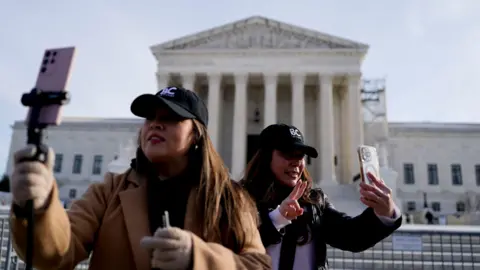The Supreme Court is hearing TikTok’s final appeal against the US ban

 Getty Images
Getty ImagesThe future of the TikTok desegregation or ban law is now in the hands of the US Supreme Court after hearing three hours before the social media deadline.
On Friday, a nine-judge court heard from lawyers representing TikTok, content creators and the US government on whether a law requiring its ban in the US – unless it is sold by parent company ByteDance – threatens free speech.
Noel Francisco, the former US attorney general who represented the forum, stressed that the ban would undermine that constitutional right of about 170 million US users.
A representative of the platform’s creators said that they should be free to use the publisher of their choice.
But the government urged the judges to uphold the law passed by Congress last year.
It passed anti-TikTok legislation with support from both the Democratic and Republican parties – a moment that marked the culmination of years of concern over the notorious platform, known for its youth-driven videos.
It requires ByteDance to sell TikTok in the US or cease operations on January 19.
On Friday, Justice Department attorney Elizabeth B Prelogar argued before the court that ByteDance’s relationship with the Chinese government made it a national security threat.
He told the court that Beijing “could arm TikTok at any time to harm the United States”.
He later said that TikTok’s warning to users would not be enough to address concerns about its relationship with China, and would not address national security issues.
Towards the end of the hearing, Mr Francisco sought to emphasize the argument that “the government will not impose restrictions on speech to protect us from speaking”.
“That’s exactly what this law does from beginning to end.”
But his arguments were heavily scrutinized by the justices, who repeatedly returned to the national security concerns that created the law in the first place.
Justice Brett Kavanaugh raised concerns the US government has raised about the data the app collects from its users and how that data can be used.
The relative risks seem to be “a serious concern for the future of the country”, he said.
Trump’s question
In December, US President-elect Donald Trump urged the court to delay its decision until he returns to the White House so that he can find a “political solution” to solve the problems at hand.
A lawyer for TikTok told the court on Friday that, as far as he could see, the platform would go dark on January 19 without intervention.
Ms Prelogar, opposing the US justice department, said “nothing permanent” was supposed to happen that day and there was still time to sell.
Forcing the app to go dark could be the “jolt” ByteDance needs to consider selling, he said.
“It will fundamentally change the landscape in terms of what ByteDance might consider,” he said, comparing the situation to a “game of chicken” and one in which the US should not “blink first”.
The judges will now consider their decision. A decision is expected in the coming days.
More than 100 people braved the tense atmosphere in Washington DC to attend the hearing in person.
Danielle Ballesteros, a student at UC San Diego, said she had been waiting outside the court since 06:30 local time.
“I feel that TikTok does not deserve to be banned,” he told BBC News.
While he admits to using it “probably too much”, he said he believes the app is an important news source for his generation.
The law passed by Congress does not ban the use of the app, but it will require tech giants like Apple and Google to stop offering it and prevent updates, which analysts suggest will kill it in the long run.
The US says TikTok is a “serious” threat because the Chinese government could force its owner, ByteDance, to turn over user data or manipulate user data to serve Chinese interests.
TikTok has repeatedly denied any possible influence from the Chinese Communist Party and has said the law violates the First Amendment free speech rights of its users.
TikTok is already banned from government devices in many countries, including the UK. It faces a complete ban in some countries, including India.
Last December, a a three-judge appeals court decision upheld the lawnoting China’s record of working with the private sector and said the move was justified as “part of a broader effort to combat a well-documented national security threat” by the country.
Jeffrey L Fisher, a law professor at Stanford University who is representing the creators suing the law, told the court on Friday that the country has been dealing with “anti-foreign ideological campaigns”.
But he said that under the First Amendment, mere opinions do not pose a threat to national security.
Source link



